Writing a book is a journey of self-discovery, storytelling, and the ultimate test of discipline. But, let's be honest, it's also a challenge that can sometimes feel overwhelming. From plot development to character creation, there are a million decisions to make, and it's easy to feel stuck.
But what if there was a tool that could provide some guidance? A tool that could help you overcome writer's block and develop your story more effectively?
Welcome to the 21st century, where ChatGPT can assist authors with all those tasks.
In this post, I'll show you a series of ChatGPT prompts specifically designed to help you write a book. These prompts can inspire new plot ideas, assist in character development, and even guide you when you're stuck on a tricky chapter.
These are the best ChatGPT Prompts for writing a book:
- Generate a book outline
- Write book chapters
- Develop a plotline
- Create characters
- Establish a scene
- Write dialogues
- Help with book research
- Get feedback on writing
- Handle marketing, promotion, and outreach
In the next section, we'll take a closer look at each aspect of writing a book (along with the prompt examples). And if you read till the end, you'll also find a tip to use these prompts more effectively.
ChatGPT Prompts for Writing a Book
When it comes to using ChatGPT to write a book, there are 9 cases where ChatGPT can help. And in this section, we'll go over each use case individually.
1. To Generate a Book Outline
Crafting a captivating book outline is not an easy task, but with the help of the first ChatGPT prompt, it becomes much easier. The prompt will help you create an engaging and well-structured outline that will serve as a roadmap for your book.
Act as a seasoned writer. Generate a book outline based on the premise: [describe the premise]. The book should consist of [n] chapters that effectively develop and present the story. The outline should provide a clear and logical structure, including key plot points, character arcs, and thematic development. Each chapter should have a specific purpose and contribute to the overall narrative. The outline should also consider pacing and flow, ensuring a balance between action, suspense, and character development. Additionally, consider incorporating subplots, conflict, and resolution into the outline to create a well-rounded and engaging story.This prompt was generated by our ChatGPT prompt generator.
2. To Write Book Chapters
It can be a challenge to start a new chapter, especially if you're unsure of where it should lead. With the help of the next prompt, you'll be able to craft compelling chapters that keep your readers hooked.
Act as an experienced writer. Write a chapter for a book that [chapter description]. The chapter should captivate readers and provide valuable insight or information related to the overall theme or plot of the book. Make sure to maintain a consistent tone and writing style that aligns with the rest of the book.This prompt was generated by our ChatGPT prompt generator.
3. To Develop a Plotline
Plotlines are the backbone of any great book. They pull the reader in, create suspense, and provide a satisfying conclusion, but they're not easy to come up with. And that's exactly where the next prompt can help.
Act as an experienced writer. Develop an intriguing and captivating plot that will captivate readers from beginning to end. Ensure that the plotline contains well-developed characters, compelling conflicts, and a unique and memorable setting. Pay attention to pacing, suspense, and character growth to create a narrative that will keep readers turning the pages and leave a lasting impression.This prompt was generated by our ChatGPT prompt generator.
4. To Create Characters
The next prompt will help you in creating characters. Because as we know, characters are the lifeblood of any story. And with this prompt, you'll be able to shape compelling characters for your novel in no time.
Act as a Book character development specialist. Design a compelling book character that [character description]. Dive deep into the psyche of the character, understanding their motivations, fears, strengths, and weaknesses. Create a detailed backstory, physical description, and emotional arc that aligns with the story's overall narrative. Ensure that the character resonates with readers and adds depth to the storyline.This prompt was generated by our ChatGPT prompt generator.
5. To Establish a Scene
In any book, setting the scene is a critical step to immerse your readers into the world you've created. It can be tricky, but with the prompt below, it doesn't have to be.
Act as a seasoned book writer. Develop a detailed setting that [setting description]. The setting should be vivid, immersive, and capable of transporting the reader to this place when they dive into the narrative. Ensure that the setting is both believable and intriguing, drawing readers in and making them eager to explore more of this world you've created.This prompt was generated by our ChatGPT prompt generator.
6. To Write Dialogues
Writing realistic and engaging dialogue can be challenging. But with the prompt below, you'll easily create dynamic dialogues that captivate your readers.
Act as a seasoned book writer and dialogue expert. Craft a compelling and engaging dialogue between [characters] as they discuss [topic]. The dialogue should reflect each character's unique voice, background, and perspective. Incorporate nuances, conflicts, or mutual understanding to showcase the depth and dynamics of their relationship. The dialogue should flow naturally, offering a realistic pace and rhythm that maintains the reader's interest. Pay attention to the subtext, ensuring that what is unsaid is just as impactful as what is spoken. Ensure that the conversation progresses the storyline or reveals significant character insights, delivering both depth and substance to the overarching narrative.This prompt was generated by our ChatGPT prompt generator.
7. To Help With Book Research
Research helps you build an authentic narrative and credible characters. And using the next ChatGPT prompt, conducting in-depth and efficient research has never been easier.
Act as a book research expert. Conduct a comprehensive and detailed investigation into the [topic] to provide accurate, relevant, and current information for the book project. Your research should cover various credible sources, including academic papers, expert opinions, primary sources, and trusted publications. Organize your findings in a clear and structured manner, making them easy to reference and understand. Highlight key insights, statistics, anecdotes, or case studies that can add depth and authenticity to the book's narrative. Ensure all information is properly cited to maintain the integrity and credibility of the book.This prompt was generated by our ChatGPT prompt generator.
8. To Get Feedback on Writing
As an author, feedback is invaluable. It helps refine your writing and ensures your story always hits the spot with your readers.
With the help of ChatGPT, you can get detailed and constructive feedback to improve your manuscript. Here's the prompt that'll help you do that.
Act as a proofreading specialist. Carefully review [certain aspect of the book] to ensure its clarity, coherence, and effectiveness in conveying the intended message. Your evaluation should focus on both the content and the style, identifying any areas that require refinement, omission, or elaboration. Check for consistency in voice, tone, and narrative flow, ensuring the [certain aspect] aligns well with the overarching theme and intent of the book. Provide constructive feedback, offering specific recommendations for improvement, and highlighting strengths to maintain.This prompt was generated by our ChatGPT prompt generator.
9. To Handle Marketing, Promotion, and Outreach
The last prompt I'm going to share is for marketing. As you may already know, marketing, promotion, and outreach are crucial for getting your book into the hands of readers. Hopefully, the prompt below will help you achieve that.
Act as a marketing specialist with expertise in copywriting. Your primary responsibility is to devise and implement a robust marketing strategy to promote and amplify the visibility of my book titled "[book title]". Start by understanding the core themes, target audience, and unique selling points of the book. Develop a multi-channel marketing plan, identifying key platforms and mediums that align with the book's audience.
Craft compelling copy for promotional materials, including press releases, email campaigns, social media posts, and advertisements, ensuring each piece captures the essence of the book and resonates with potential readers. Use persuasive language and powerful hooks to drive interest and conversions.This prompt was generated by our ChatGPT prompt generator.
How to Use These Prompts Effectively
The prompts I mentioned today are also available in our FREE prompt directory. You can check them out here: ChatGPT prompts.

How To Generate Custom Prompts
Didn't find the prompt you need? Try our FREE ChatGPT Prompt Generator to generate one for you!

Final Thoughts
Writing a book is a journey filled with challenges and triumphs. The ChatGPT prompts I shared in this blog post are designed to help you navigate this journey with more ease and confidence.
Whether you're just starting out or looking to refine your existing work, these prompts can provide the guidance and inspiration you need to craft a story that resonates with readers.
FAQ
Let's also address some of the common questions about using ChatGPT for writing a book.
Can I use ChatGPT to write a book?
Yes, you can use ChatGPT to write a book. ChatGPT can assist you in various aspects of the book-writing process, like coming up with the concept, developing a plotline, creating characters, and much more.
Do authors use ChatGPT?
Yes, authors indeed use ChatGPT to assist with their writing process. They use it for generating ideas, creating character dialogues, and even fine-tuning plot points.
Is it legal to publish a book written by AI?
Yes, it is legal to publish a book written by AI. AI-generated text like the one produced by ChatGPT is not copyrighted, which means you can freely use and publish the content.

